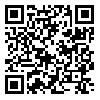Volume 8, Issue 15 (2021)
QHTS 2021, 8(15): 311-339 |
Back to browse issues page
1- a faculty member, department of foreign languages, faculty of literature and humanities, Shahid Bahonar University of Kerman, Kerman, Iran , mina_zandrahimi@uk.ac.ir
2- department of foreign languages, faculty of literature and humanities, Shahid Bahonar university of Kerman, Kerman, Iran
2- department of foreign languages, faculty of literature and humanities, Shahid Bahonar university of Kerman, Kerman, Iran
Abstract: (3353 Views)
Nahj al-balagha is one of the most valuable religious books that has a unique position among Shiite Muslims worldwide. This precious work includes significant aspects which have persuaded many to translate. Translating religious texts in comparison with others has excellent sensitivity, confronting the translators with lots of limitations. However, these texts were not an exception to manipulation. One of the most challenging subjects in this book is related to women. Women’s position in Imam Ali’s words is always in dispute among translators. The present study aimed to investigate the impact of translators’ gender and ideology in translating Nahj al-balagha’s sermons, letters, and sayings about women in Dashti and Aghamirzaei’s translations. To achieve this goal, those words and sentences related to women were selected, compared, and analyzed according to Farahzad critical discourse analysis model and Zuberga manipulation strategies. The result of the research revealed that in their translation, ideology has had a significant role and has made a great difference. Moreover, it was proved that there was no significant relationship between the translator’s gender and the gendered translation. Surprisingly, despite being a male translator, Dashti has translated these parts more positively than Aghamirzaei as a female translator.
Article Type: مقالات علمی پژوهشی |
Subject:
Arts and Humanities (General)
Received: 2021/01/4 | Accepted: 2021/05/27 | Published: 2021/05/31
Received: 2021/01/4 | Accepted: 2021/05/27 | Published: 2021/05/31
| Rights and permissions | |
 |
This work is licensed under a Creative Commons Attribution-NonCommercial 4.0 International License. |


